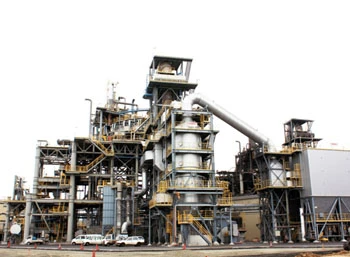
The Japanese steel companies Nippon Steel Corp. and Kobe Steel Ltd. have announced their jointly-owned steel mill dust recycling plant began commercial operation on October 1, 2011, at Nippon Steel’s Hirohata Works in Himeji, Hyogo Prefecture, Japan. The project is part of the two companies’ objective to deepen and expand their business alliance.
In Oct. 2008, the two companies announced plans to establish a joint venture to recycle steel mill dust into direct reduced iron (DRI). Construction of the plant began in May 2010 and cost around 900 million yen (US$11.7 million). Nippon Steel will control 70 percent of the joint venture, called Nittetsu Shinko Metal Refine Co. Ltd., while Kobe Steel will own the remaining 30 percent of the plant.
The steel dust recycling facility has an annual capacity of around 220,000 metric tons per year. Nippon Steel and Kobe Steel will provide the new facility with steel mill dust and iron ore fines from their steel mills as raw materials to produce DRI, as well as recover and recycle zinc.
The steel dust recycling facility uses Kobe Steel's Fastmet Process, by which steel mill dust is heated to a high temperature in a rotary hearth furnace (RHF) and undergoes reduction to produce DRI. According to an announcement, Nippon Steel will be providing the operational know how on the recycling and the effective use of steel dust.
The zinc produced through the process also will be recovered. The DRI can be used as an alternative to purchased scrap and iron ore as the main raw material, while the recycled zinc can reduce the use of zinc ore.
The DRI produced at the facility will be consumed by both Nippon Steel and Kobe Steel, with a portion going to Sanyo Special Steel Co., Ltd., a group company of Nippon Steel.
In addition to the new business, Nippon Steel is using its three other dust recycling plants at its Hirohata Works to recycle steel mill dust generated from steelmakers, including its alliance partners in the Kansai region of Japan.
Latest from Recycling Today
- BMW Group, Encory launch 'direct recycling’ of batteries
- Loom Carbon, RTI International partner to scale textile recycling technology
- Goodwill Industries of West Michigan, American Glass Mosaics partner to divert glass from landfill
- CARI forms federal advocacy partnership
- Monthly packaging papers shipments down in November
- STEEL Act aims to enhance trade enforcement to prevent dumping of steel in the US
- San Francisco schools introduce compostable lunch trays
- Aduro graduates from Shell GameChanger program





